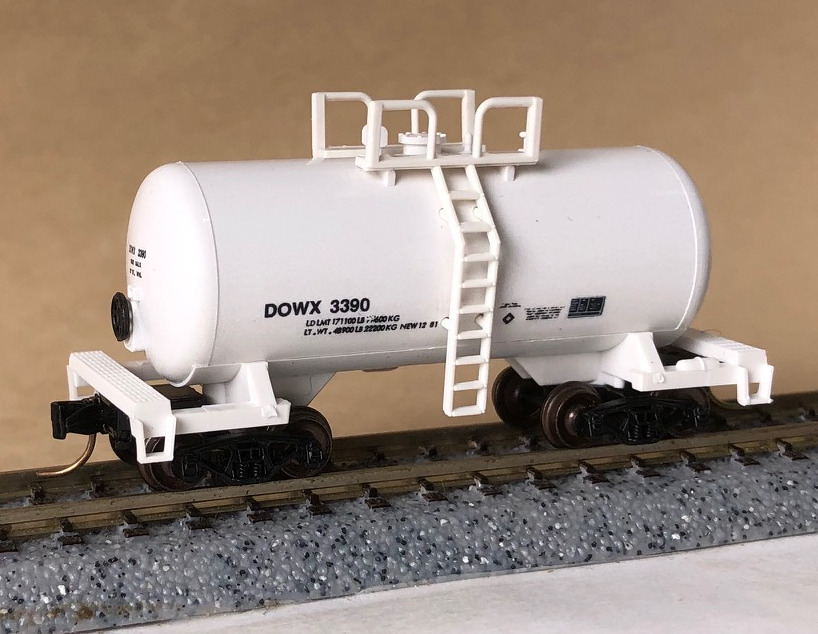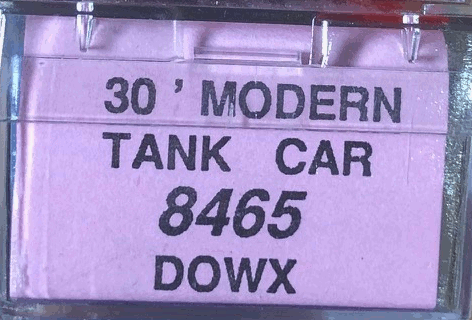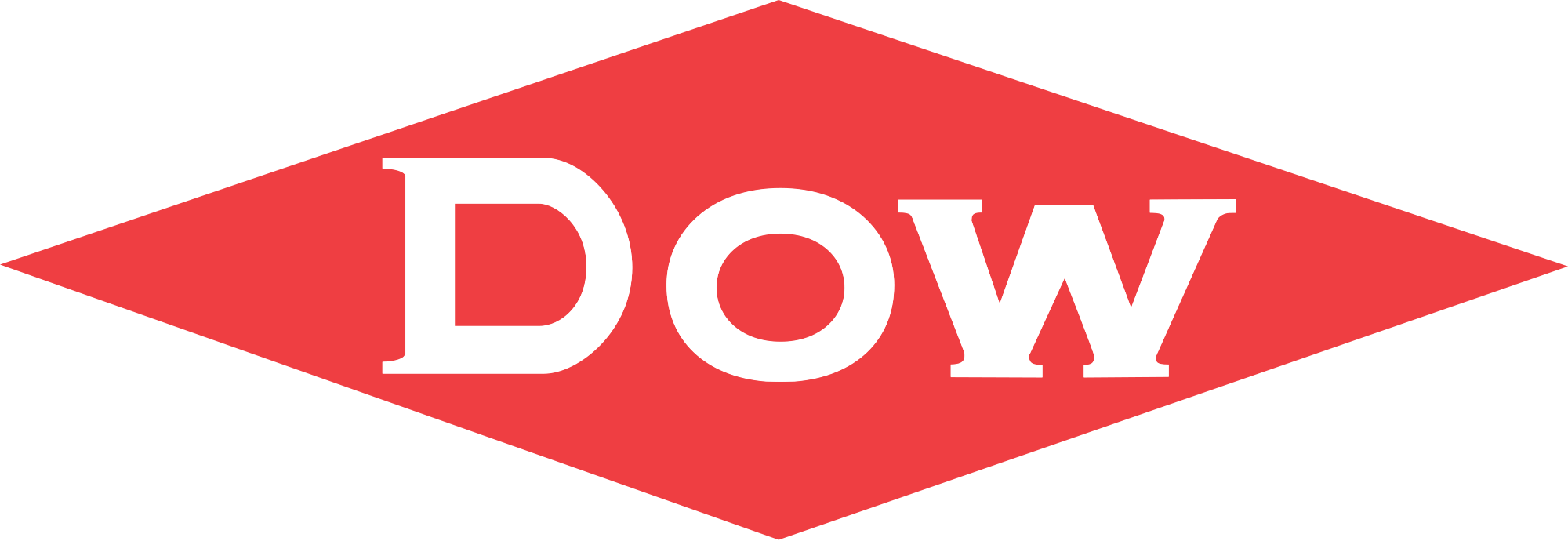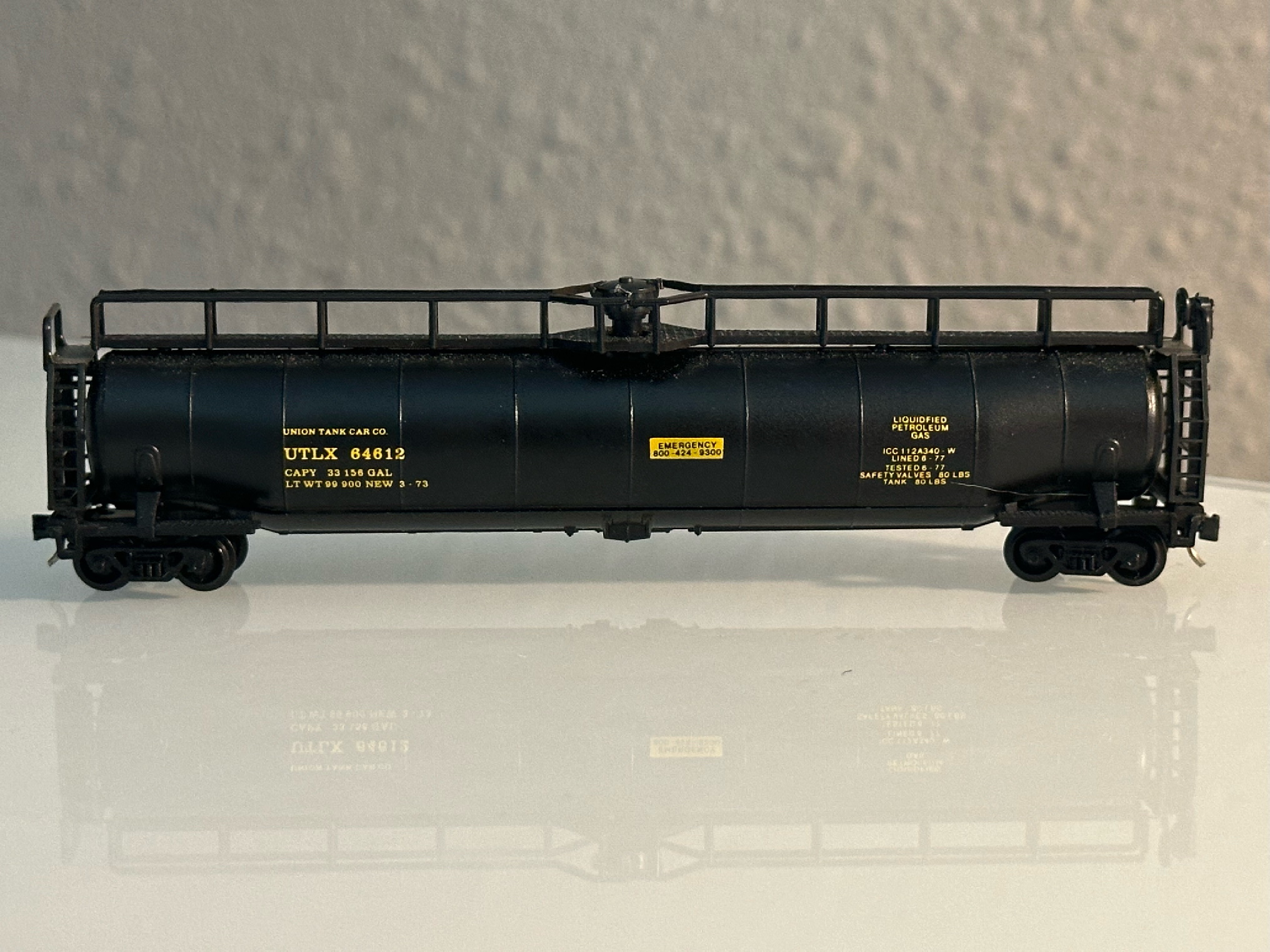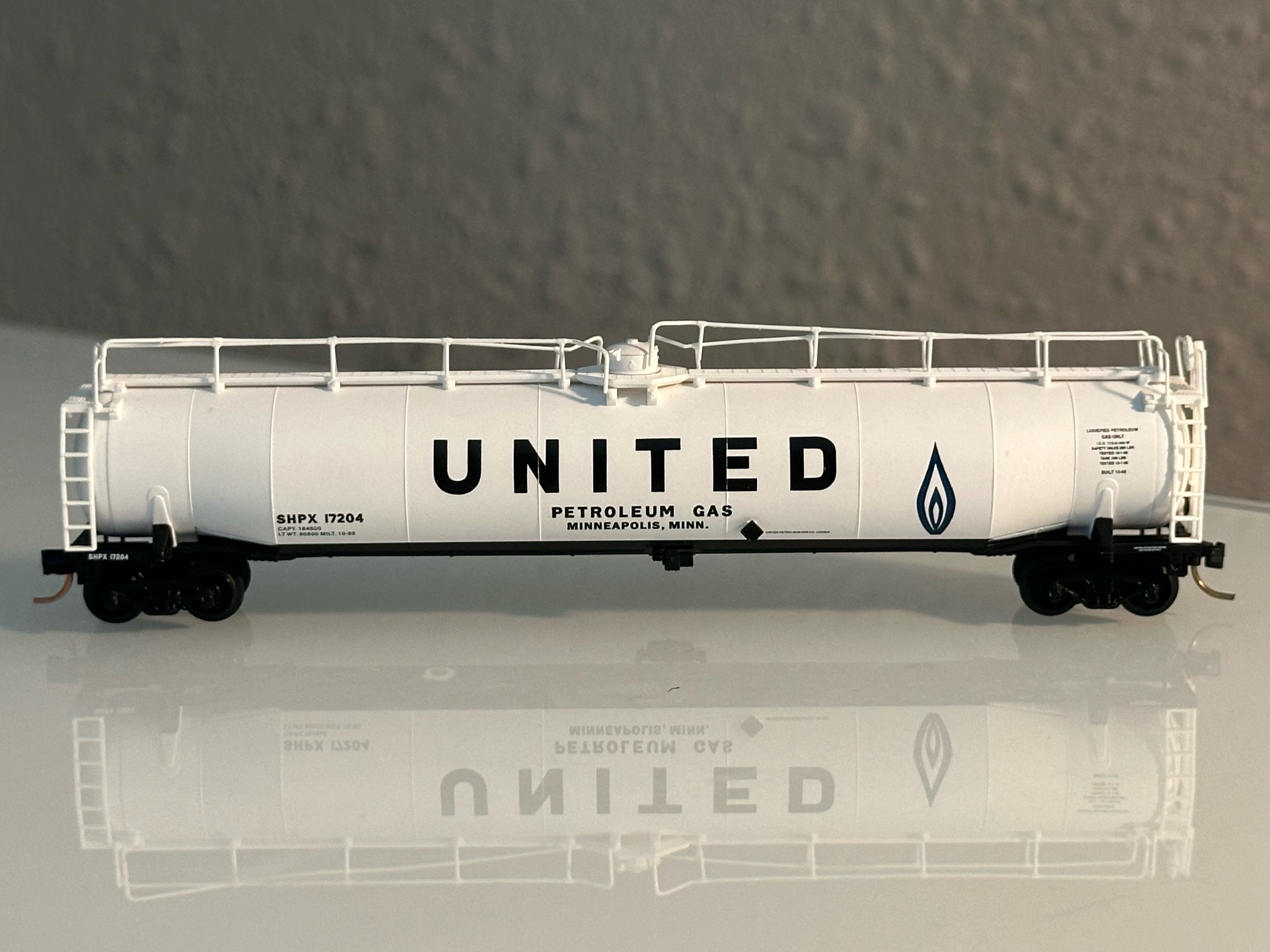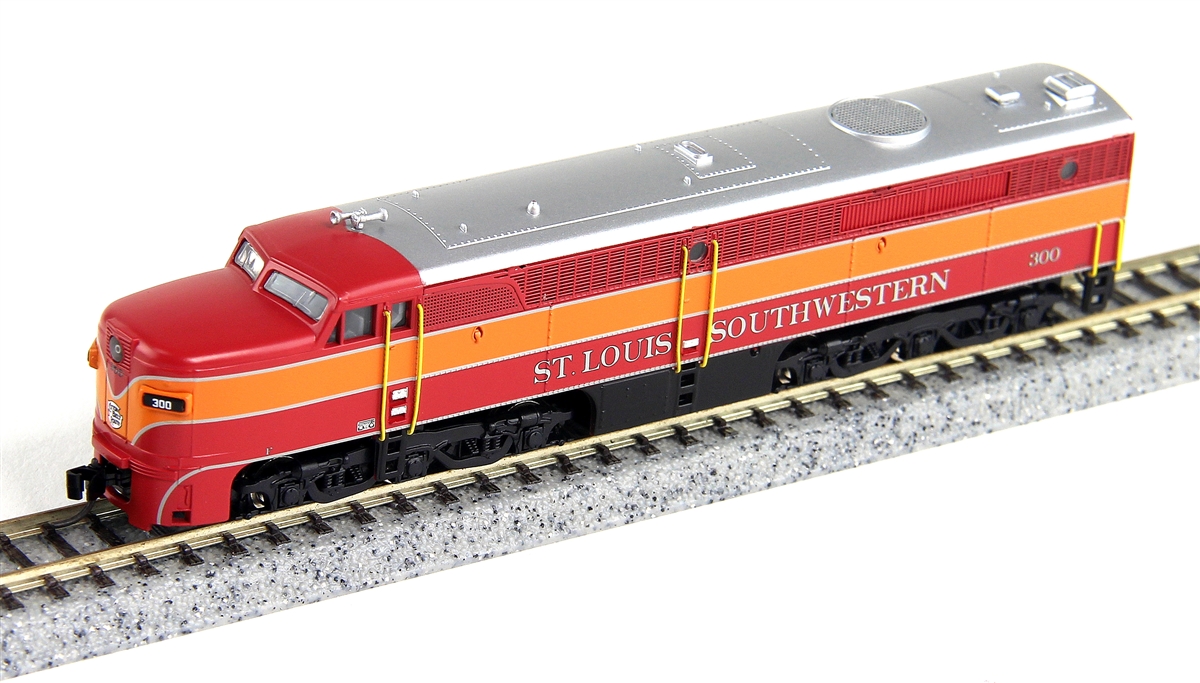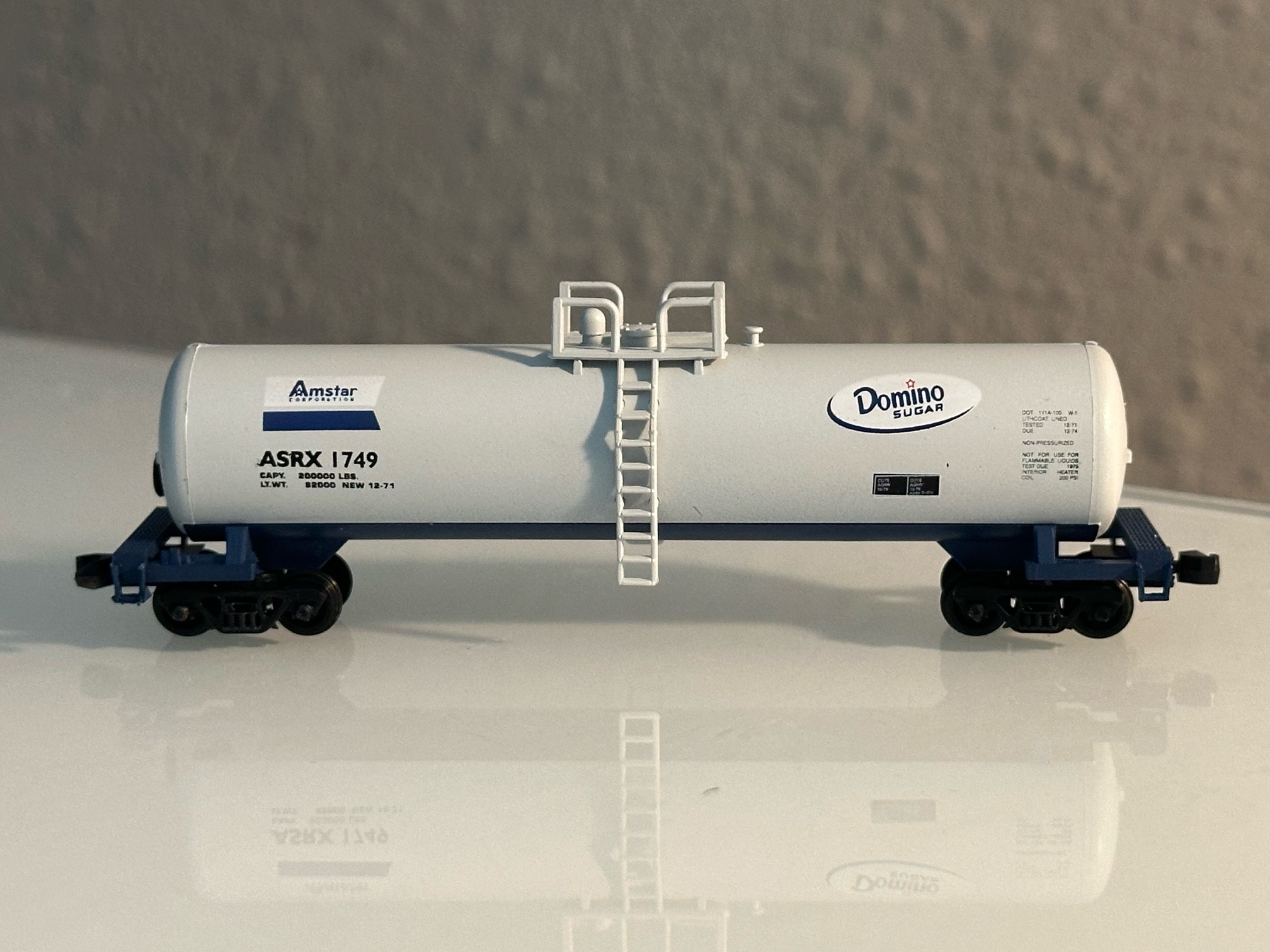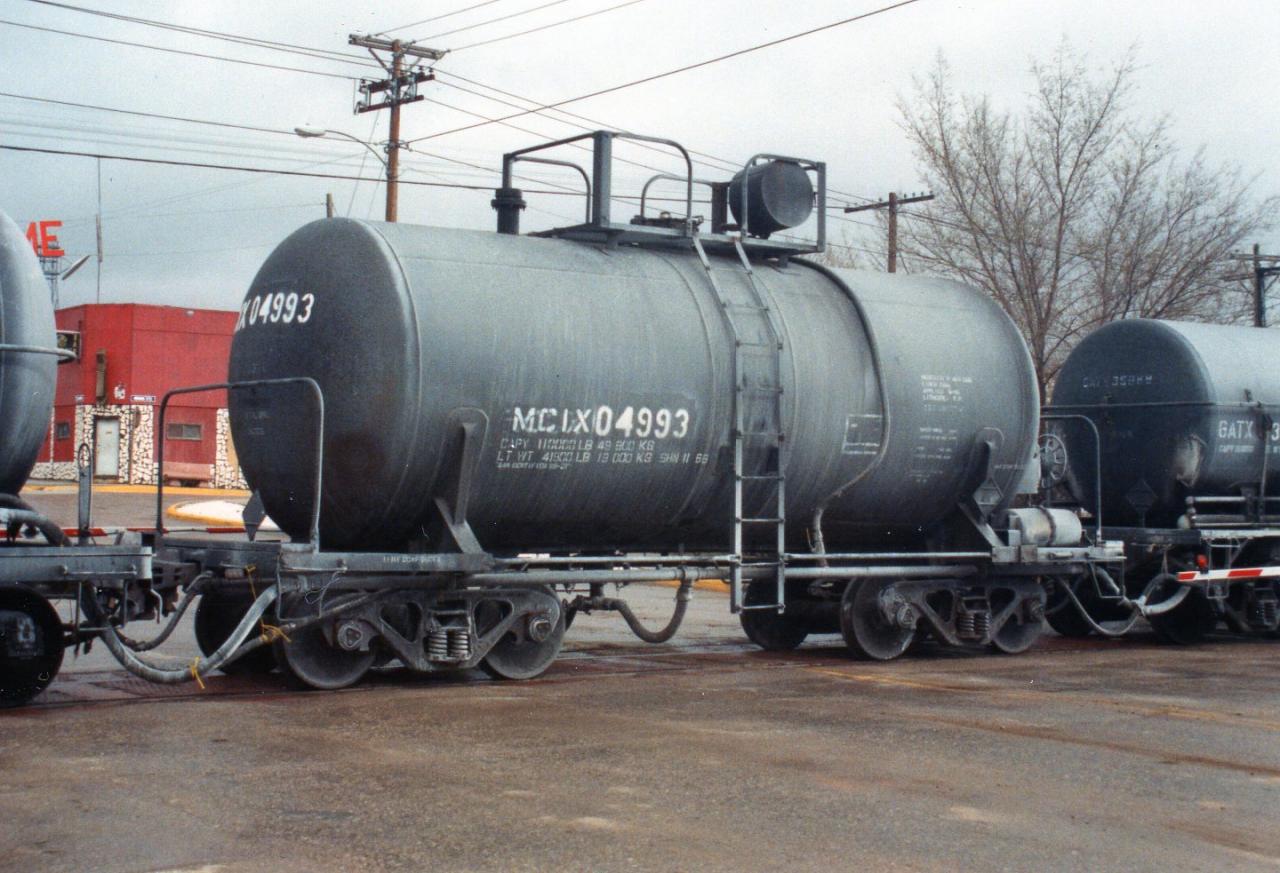Model Information: This body style is MDC's knock-off version of the tremendously successful Atlas 29' Beercan tank car. Given that the tooling is about 20 years newer than the Atlas version, this car is actually the better model of the two. Details like the stirrup steps really highlight the improvements in the injection molded plastic industry. The printing is very high grade and the trucks and couplers are higher quality than the contemporaneous Atlas releases. Unfortunately, MDC never ran very many versions of this car and Athearn, so far, has neglected to re-release the cars under their own name since the acquisition of MDC by Athearn in 2004.
The first release of this car (with the 4-digit product code) was available in kit form. Do not be scared off by this if your modeling skills are not great. The car assembles without any glue or paint. You simply need to attach the frame to the body (using friction), add the ladders (again with friction) and then simply pop in the trucks. The later (5-digit product code) release were made and assembled in China as RTR (Ready-to-Run) models.
The first release of this car (with the 4-digit product code) was available in kit form. Do not be scared off by this if your modeling skills are not great. The car assembles without any glue or paint. You simply need to attach the frame to the body (using friction), add the ladders (again with friction) and then simply pop in the trucks. The later (5-digit product code) release were made and assembled in China as RTR (Ready-to-Run) models.
Prototype History: These cars transport higher value commodities which typically are shipped in smaller amounts. One example is corn syrup. Some carry petroleum refining catalysts, sulfuric acid and sodium hydroxide. The typically ride on roller bearing trucks with 33 inch wheels.
Road Name History: The Dow Chemical Company (NYSE: DOW), commonly referred to as Dow, is a multinational chemical corporation headquartered in Midland, Michigan. Dow provides chemical, plastic, and agricultural products and services to consumer markets that include food, transportation, health and medicine, personal care and construction, and operates in approximately 180 countries.
As of 2014, Dow ranked third in chemical production (after BASF and Sinopec), and as of 2015, was the third largest chemical company in the world by revenue (after Sinopec and BASF). Dow was also the world's largest chlorine producer, with 5.7 billion tons a year of production before Dow's association with Olin was formed; was ranked as the world's largest plastics manufacturer during 2008, and the largest manufacturer of polyalkylene glycols in 2013.
Dow's principal lines of business include Agricultural Sciences, Consumer Solutions, Infrastructure Solutions, Performance Materials & Chemicals, and Performance Plastics. It employs approximately 53,000 people worldwide. Dow's 2014 sales totaled approximately $58.2 billion. Dow has been called the "chemical companies' chemical company" in that most of its sales are to other industries rather than end users, although Dow sells directly to end users primarily in the human and animal health, agriculture, and consumer products markets.
The company was founded in 1897 by Canadian-born chemist Herbert Henry Dow. After a period of diversification, it became a major chemical company, a significant player in the world market, and a part of the military-industrial war effort during both World Wars.
As of 2014, Dow ranked third in chemical production (after BASF and Sinopec), and as of 2015, was the third largest chemical company in the world by revenue (after Sinopec and BASF). Dow was also the world's largest chlorine producer, with 5.7 billion tons a year of production before Dow's association with Olin was formed; was ranked as the world's largest plastics manufacturer during 2008, and the largest manufacturer of polyalkylene glycols in 2013.
Dow's principal lines of business include Agricultural Sciences, Consumer Solutions, Infrastructure Solutions, Performance Materials & Chemicals, and Performance Plastics. It employs approximately 53,000 people worldwide. Dow's 2014 sales totaled approximately $58.2 billion. Dow has been called the "chemical companies' chemical company" in that most of its sales are to other industries rather than end users, although Dow sells directly to end users primarily in the human and animal health, agriculture, and consumer products markets.
The company was founded in 1897 by Canadian-born chemist Herbert Henry Dow. After a period of diversification, it became a major chemical company, a significant player in the world market, and a part of the military-industrial war effort during both World Wars.
Brand/Importer Information:  MDC Roundhouse was founded in California in 1938 and relocated in 1993 to Carson City, Nevada due to statewide restrictions on painting. MDC Roundhouse was a producer of both RTR (Ready-to-Run) and kit versions of N Scale rolling stock as well as RTR locomotives. They entered the N scale market in 1979 with a Thrall Hi-Side Gondola and a Hi-Cube Single Door Box Car. MDC Roundhouse was purchased by Horizon Hobbies in June of 2004, when its owner since 1938 C. H. Menteer retired, and merged into their Athearn line.
MDC Roundhouse was founded in California in 1938 and relocated in 1993 to Carson City, Nevada due to statewide restrictions on painting. MDC Roundhouse was a producer of both RTR (Ready-to-Run) and kit versions of N Scale rolling stock as well as RTR locomotives. They entered the N scale market in 1979 with a Thrall Hi-Side Gondola and a Hi-Cube Single Door Box Car. MDC Roundhouse was purchased by Horizon Hobbies in June of 2004, when its owner since 1938 C. H. Menteer retired, and merged into their Athearn line.
Unlike many of their contemporaries which contracted with European firms to produce their products, MDC made their own toolings. They made several popular body styles and produced them for road names that many other vendors (even Micro-Trains) wouldn't touch. This made them popular with modelers. Also, their un-assembled "kits" permitted a lower price point so they were popular with "runners" as well as "modelers".
Of particular interest was the attention given to modern 50 foot steel boxcars. They made some attempt to accurately mold the differences into distinct models to represent each of the major prototype manufacturers products. They have distinct toolings not only for the different products from FMC, BFF and PS, but also multiple models for each of these manufacturers including "standard" vs "Youngstown" doors and "waffle" vs. "rib" sides. In total they produced 13 different versions of the 50 foot steel boxcar.

Unlike many of their contemporaries which contracted with European firms to produce their products, MDC made their own toolings. They made several popular body styles and produced them for road names that many other vendors (even Micro-Trains) wouldn't touch. This made them popular with modelers. Also, their un-assembled "kits" permitted a lower price point so they were popular with "runners" as well as "modelers".
Of particular interest was the attention given to modern 50 foot steel boxcars. They made some attempt to accurately mold the differences into distinct models to represent each of the major prototype manufacturers products. They have distinct toolings not only for the different products from FMC, BFF and PS, but also multiple models for each of these manufacturers including "standard" vs "Youngstown" doors and "waffle" vs. "rib" sides. In total they produced 13 different versions of the 50 foot steel boxcar.
Item created by: CNW400 on 2020-06-11 16:57:38. Last edited by gdm on 2020-12-17 19:49:02
If you see errors or missing data in this entry, please feel free to log in and edit it. Anyone with a Gmail account can log in instantly.
If you see errors or missing data in this entry, please feel free to log in and edit it. Anyone with a Gmail account can log in instantly.


